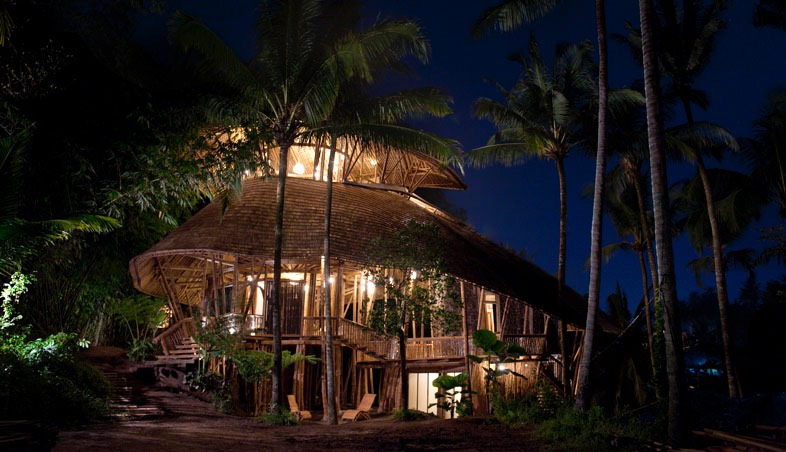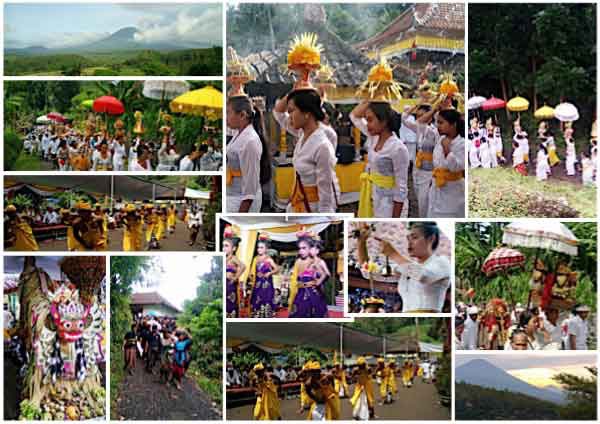
Photo http://greenvillagebali.com/gallery/ “Stuff for Bionairs”

MET Mythology - Ecology -Technology
A whole new sense of sustainable thinking
A tourist attraction in the form of a mythological botanical garden designed for two rural villages on East Bali, Indonesia.
The project simultaneously act as a feasibility study for sustainability living, working, agriculture and ecotourism in tropical climates.
The latest sustainable technology and products will be tested to see how to minimize the impact on the natural environment. (ALARA principle)
Bali M.E.T. tourism
From the heavenly spheres above Gunung Agung the gods look down on the immense swarm of mortals, playing under them.
Men and women dressed in sarongs decorated with brocade belts, populate the paths and roads. The women kneel here and there and perform short rituals. The air is laden with incense and soft gamelan music accompanies the man on his way to his meeting. Colorful ceremonies have been virtually unchanged over the centuries. Since Bali possesses 30,000 temples of various sizes festivities are a daily happening. Even in the 21th century, life is still intertwined with ancient traditions. A simple ceremony with happy rhythmic sounds seduces the Balinese to various dances in their very elegant and inimitable way.
Bali is much more than just a sunny tourist destination, it is an unprecedented experience; visitors decide which aspect excites them most. The M.E.T. (Myth-Eco-Techno) experience is Bali's newest form of sustainable Infotainment tourism. M.E.T. guests come to enjoy the mythology, the sun and the enchanting landscape and technology (past-present-future) everything combined together in the Paradise of the Future. "Baliphiles" Guests who stay longer, more frequent, or even live, go for the deeper experience, they explore and absorb. They seek the magic and magical way of life by life. Fervent they search for the roots of beauty and drama on the island.
The Where and What of BALI MET
A jewel named Bali is roughly in the center of the emerald belt, a chain of 14,000 islands and islets between Southeast Asia and Australia just below the equator, and three kilometers from Java's east coast.
Bali, a Hindu enclave in a Muslim nation, is a treasure room of Hindu culture. The Balinese are only one of the 300 ethnic groups in Indonesia and their language is one of the 250 different spoken in the country. The natural beauty of the Balinese landscape is legendary. With an area of 5632 square kilometers is home to the island of majestic mountains, fertile hills, cut by deep valleys and tall palm beaches surrounded by coral reefs. On the central northern part runs a chain of semi-active volcanoes. The highest and most revered is the Gunung Agung, the cone rises 3142 m. above sea level. This sacred mountain is "The bellybutton of the world".
Until today many of the 2.6 million inhabitants consider their fairytale island even as a separate universe. For them, Bali means the world and being a Balinese is an exclusive privilege. Balinese consider the mountains as the abode of gods. They believe that heaven is an exact reflection of the lovely Balinese landscape, but the sea is dangerous: the realm of demons, monsters, and evil forces. So unlike most islanders, Balinese are no professional fishermen. The majority are farmers and live and work on the terraced slopes, in a subtle and harmonious balance between the mountains and the sea. The Balinese are of Malay-Polynesian origin and their ancestors migrated more than 2,000 years ago from southern China. The island is blessed with fertile lands and protected by a rugged coastline, proved a good choice. The coral reefs and treacherous currents saved the islanders foreign interference. For centuries the Balinese knew no strangers except for a few bold Chinese navigator or some Hindu priests who came from Java for missionary purposes. In the year 1343 Bali's history took a turn when the Hindu-Javanese Majapahit empire settled here. General Gajah Mada turned off the local ruler and established the new Majapahit court in Gelgel. The land was divided among the conquerors, the holy temple of Pura Besakih elevated to the main temple and the Balinese slowly took on the culture and different habits of the Javanese conquerors. During the next 150 years, while advancing Islam in Java, Hindu courtiers migrated eastward to Bali. They formed the upper layer of Java's most civilized people, the Wong Majapahit; a whole new kind of nobles and priests, art, religion and philosophy was brought intact.
THE PARADISE OF THE FUTURE
Taman Dwarawati, Krisna's garden.
In natural balance with the Bali described above, we have at the request of the residents of the two villages: Dukuh and Tauka, Br.Dukuh Bukit Ngandang, Karangasam province in eastern Bali developed a MET Plan.
After years of friendship did Komang Sumarana on behalf of the "Banjar" village council us the request to consider, designing an environment and culture friendly form of employment for the largely unemployed or exodus of youth in his village Dukuh. A new kind of economic model different from the tourist facilities; Kuta, Ubud, Celuk, etc., where opportunism have caused deforestation and commercial sprawl.
After two years looking, feeling, and especially talking to the locals the design concept matured for the "PARADISE OF THE FUTURE", spirituality, ecology, technology forged together into a theme park where Dukuh and Tauka as traditional villages form the core.
Opted for a Hindu-Spiritual-Botanical Garden where the application of the latest eco-technology must ensure that the natural environment ALARA (as low as reasonable achievable) will be taxed. Technology will be like when the nobles and priests, art, religion, and philosophy brought with them from Java, can contribute to the cultural wealth. Art, religion, and philosophy are globally accessible via the Internet.
Interactively during the design, construction and eventual the life in the “ aradise of the future." 24 hours a day via TelePresence (webcams), eyes and ears to see and hear what is happening in real time. exchanging information, making friends and who knows, the next step is visiting Bali yourself.